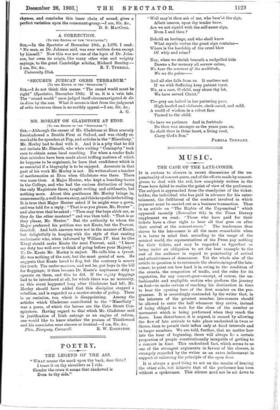MR. MORLEY ON GLADSTONE AT ETON.
[To THE EDITOR OP THE " SpEcrAToR."1 SIR,—Although the career of Mr. Gladstone at Eton scarcely foreshadowed a Double First at Oxford, and was chiefly re- markable for speeches at Pop, and articles in the "Miscellany," Mr. Morley had to deal with it. And it is a pity that he did not imitate Mr. Disraeli, who when writing " Coningsby " took care to obtain some local coaching. For when a reader finds that mistakes have been made about trifling matters of which be happens to be cognisant, he loses that confidence which is so essential if a biography is to be enjoyed. Accurate in that part of his work Mr. Morley is not. He writes about a teacher of mathematics at Eton when Gladstone was there. There was none then. A Major Heater, who kept a boarding-house in the College, and who had the curious distinction of being the only Magistrate there, taught writing and arithmetic, but nothing more. About this gentleman Mr. Morley brings in, unnecessarily, a well-known story, and this he spoils in the telling. It is true that Major Heater asked if he might wear a gown, and was told for a reply : " That is as you please, Mr. Heater" ; and also true that he asked : " Then may the boys shirk me, as they do the other masters P " and was then told : " That is as they please, Mr. Heater." But the authority to whom the Major• preferred his petition was not Keefe, but the Provost, Goodall. And both answers were not in the manner of Keefe, but delightfully in keeping with the style of that canting ecclesiastic who, when informed by William IV. that he (the King) should make Keats the next Provost, said: "I know my duty too well ever to think of going before your Majesty." To Dr. Keefe Mr. Morley is unjust. He calls him a tyrant. He was nothing of the sort, but the most genial of men. He suggests that Keats loved to flog, but the contrary is nearer the truth. The under-masters, and not he, put boys in the bill for floggings; it then became Dr. Keate's unpleasant duty to operate on them, and this he did. If the eighty floggings had to be introduced at all, for which there was no necessity, as this event happened long after Gladstone had left, Mr. Morley should have added that this discipline stopped a rebellion, and is regarded as a master-stroke of policy. There is an omission, too, which is disappointing. Among the articles which Gladstone contributed to the " Miscellany " was a poem, of which the heroes are the Cato Street Con- spirators. Having regard to that which Mr. Gladstone said in justification of Irish outrage as an engine of reform, one would like to know whether• the praises of Thistlewood and his associates were sincere or ironical.—I am, Sir, &c.,






































 Previous page
Previous page